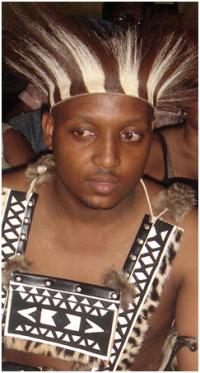Posted on June 22, 2010

I've been involved in the family history research for more than a decade: from 1995 to 2004 I was employed in community radio stations - Radio Khwezi and Imbokodo FM. In both stations I was the producer of family history programmes respectively called Iziko and Kusadliwa Ngoludala. At these stations is where I developed an interest in studying family histories. I used to get correspondence from the listeners and they all had similar question: Where did our people originate? This caused me to start researching the origins of the Nguni people and of some of the groups who form part of the Nguni speaking people of South Eastern Africa of whom my clan, abaMbo, is a branch.
I worked on the history of the Zulu Royal family. When it was complete, I decided to study the abaMbo. It was the year 1999 when I started my journey through the family of Mkhize. I had a goal that I wanted to collect the clan history and compile a book that would be published and used by our people and serve as a reference for future generations.
Importance of Oral History
In most indigenous groups history was not recorded in writing, but was recorded in the family praise songs (izithakazelo/iziduko), royal praises (izibongo zamaKhosi) and most of this history was delivered to younger generations through the word of mouth. Hence I had to use oral history. For this reason I had to travel long distances visiting different people who had different backgrounds but share the same ancestral lineage. I visited old citizens of eMbo, prominent people like amaKhosi, politicians and radio personalities. I also attended family gatherings, and clans' commemorations. I was trying to reach every member of the clan who could assist with the needed information.
I visited libraries, national archives, museums where one could get information about abaMbo people. The books that were crucial to me are: Olden Times in Zululand and Natal written by A.T. Bryant, the James Stuarts Archive of Recorded Oral Evidence Relating to the History of the Zulu and Neighboring Peoples and Abantu Abamnyama Lapho Bavela Khona written by Magema Fuze.
Uhlanga Lwas'eMbo - History of eMbo People
In 2007 I was able to publish a book called Uhlanga lwas'eMbo, where I joined the pieces of the puzzle. The first chapter looks at the arrival of the abaMbo-Nguni group from central Africa. It is named after the title of the book, “Uhlanga Lwas'eMboâ€Â. The name uHlanga means the main stem or the nation and lwas'eMbo means of eMbo. In Nguni languages the name uHlanga is mostly used to identify or salute the indigenous people, and their traditional leaders.
In the first chapter I tell the world that we had an established nation which was known as abaMbo or abaseMbo (those of eMbo). They were neighboring other nations who also migrated to South Eastern Africa, who were part of the Nguni speaking communities, but historically and genealogically unrelated to abaMbo. These were nations like abaThembu, amaNtungwa, abeSuthu, amaThongo, etc. All these nations were ruled by hereditary heads of their families. When the family had grown or expanded sub-clans were established and they had to pay their allegiance to the senior house. The nation or clan had only one iNkosi (king) and other amakhosi were called izikhulu (chiefs).
In the late 16th century most of the Nguni-speaking communities immigrated to South Africa. The abaMbo group made their appearance through the Lubombo Mountains, and that's where they separated and formed new nations, cultures and dialects. These nations are today known as AmaSwati, AmaHlubi, AmaMpondo, AmaMpondomise, AmaDlamini and AmaKhize who are better known as abaMbo. These nations are genealogically related, but they comprised of different languages, culture and heritage, and they mostly occupy the south eastern regions of Africa.
The rest of the book focuses on the abaMbo-Mkhize, the clan whom I was initially interested to study. The second chapter tells how abaMbo occupied the eNkandla valley from Lubombo Mountains and who their leader was at that time. In this chapter one would also find the list of new clan who were born by Mkhize family but separated from the main stem and formed new polities: amaMpondo, amaMpondomise, amaXesibe, amaThembela (Magcaba), amaPhampuka (Ngcongo), amaLebuka (Hlengwa), amaDima (Shange) and amaBhida (Mabhida). In other chapters I narrate the history of amaKhosi Ohlanga (traditional leaders from the chief house of the Mkhize family) and their role in defending the abaMbo polity. I also look at the battles fought with other clans, historical events and praise poems. Some praise poems are more than 300 years old, yet they are still accurate and the history is preserved through them.
Old photos of highly recognized amaKhosi, which I obtained from royal families, are also inserted. In other chapters I've listed the eMbo royal regiments and royal homesteads. I managed to construct one big family tree, where all the 14 royal families are represented. The founding fathers of the families are listed. The Uhlanga lwas'eMbo book will help not only the Mkhize, but the entire abaMbo-Nguni to understand their origins better.
Siyabonga Mkhize was born in Umlazi, Durban. He is founder and leader of the Salem City of God Church based in Zwelibomvu and Richmond. He is currently writing an English version of Uhlanga Lwas'eMbo.